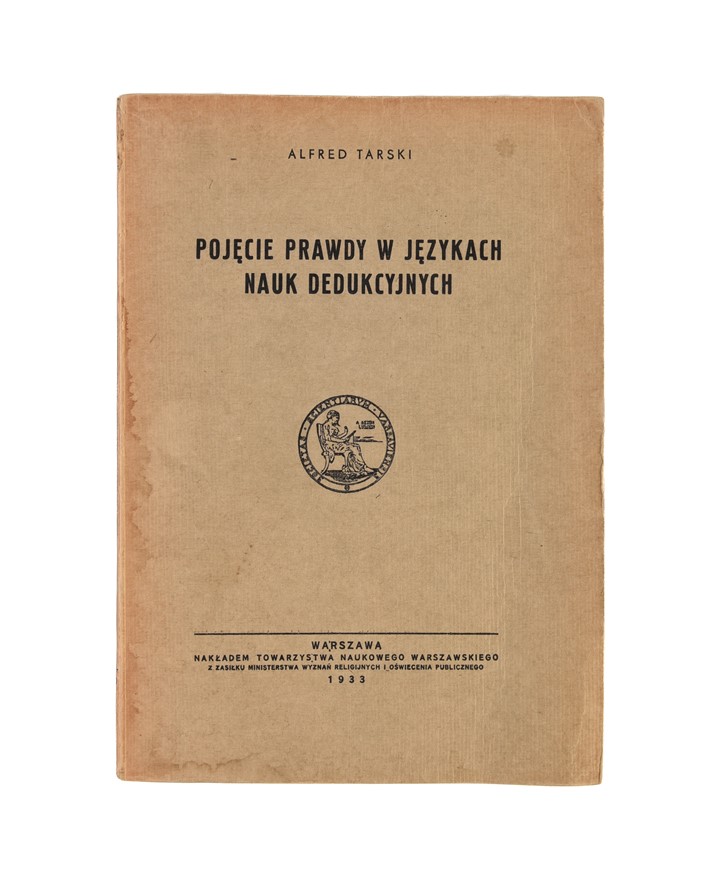Pojecie prawdy w jezykach nauk dedukcyjnych. [The Concept of Truth in Formalized Languages].
TARSKI Alfred (1933.)
£3500.00 [First Edition]
Please contact us in advance if you would like to view this book at our Curzon Street shop.
First edition. 8vo vii, 116, [1] pp. Original printed wrappers (ownership stamp of 'Jacek Kabzinski' to title, otherwise internally clean and unmarked; light wear to extremities, faint dampstain along spine, covers unevenly faded, otherwise a very good copy indeed). Housed in a green cloth backed folding box, spine lettered in gilt on black morocco label. Warsaw, Nakladem Towarzystwa Naukowego Warszawskiego.
The rare first edition of Tarski's seminal monograph 'The Concept of Truth in Formalized Languages'.
'Tarski discovered interconnections between such diverse areas of mathematics as logic, algebra, set theory, and measure theory. He brought clarity and precision to the semantics of mathematical logic, and in so doing he legitimized semantic concepts, such as truth and definability, that had been stigmatized by the logical paradoxes. Tarski's famous work on definitions of truth in formalized languages (1933-1935) gave the notion of satisfaction of a sentence in a structure for first-order logic, second-order logic, and so on. This work had a profound influence on philosophers concerned with mathematics, science, and linguistics' (DSB).
'Tarski's main contribution of the decade was his definition of truth. He claimed to have found the essential components by 1929, and they were stated without proof in the short paper [Der Wahrheitsbegriff in den Sprachen der deduktiven Disziplinen, 1932] communicated to the Vienna Academy in January 1932 which Carnap had seen. The first long version appeared in Polish as a book in 1933. Acknowledging the work of Lesniewski on semantic categories, Tarski began by pondering the definability of truth for natural languages, and decided against it, especially because of unavoidable paradoxes; he stated a version of the liar paradox due to Lukasiewicz based upon giving the sentence 'c it not true' the name 'c'. But he saw a chance for a definition in a formal language by distinguishing it from a 'second language, called the metalanguage (whcih may contain the first as a part)' and belonging to a 'second theory which we shall call the metatheory'. This is seemingly the origin of those names: Carnap, to whom 'object language' is due, mistakenly credited himself with 'metalanguage' much later. The distinction was essential to Tarski's theory, since the truth was a property in the metalanguage of a sentence correctly expressing some state of affairs in the object language: 'it is snowing' is a true sentence if and only if it is 'snowing'.
'Making use of recursive definitions, Tarski constructed a predicate calculus for the metalanguage, imitating the structure of the one in the object language. In order to ease the use of recursion, he worked with sentential functions rather than sentences: 'for all [objects] a, we have a satisfies the sentential function 'x is white' if and only if a is white.' The crucial property was 'satisfaction of a sentential function by a sequence of objects' in some domain, for from it he defined truth for any formal language with a finite number of orders of semantic category in terms of satisfaction by any sub-sequence in that domain. The background influence of Principia Mathematica was explicit in his analogy between categories and simple types, and maybe in his decision to work with sentential functions.
'Comparing Tarski with Godel, some of his techniques, and the impossibility result, correlate with incompletability and numbering; hence he was anxious to emphasise the independence of his own work, pointedly so in his Vienna note. However, his proof allowed for denumerably infinite sequences, while Godel's was finitary. Another contrast lies in Russell's understanding: Godel's theorem always escaped him, but Tarski's definition was described in his Inquiry' (Grattan-Guinness, The Search for Mathematical Roots, pp. 551-553).
Stock Code: 239503




